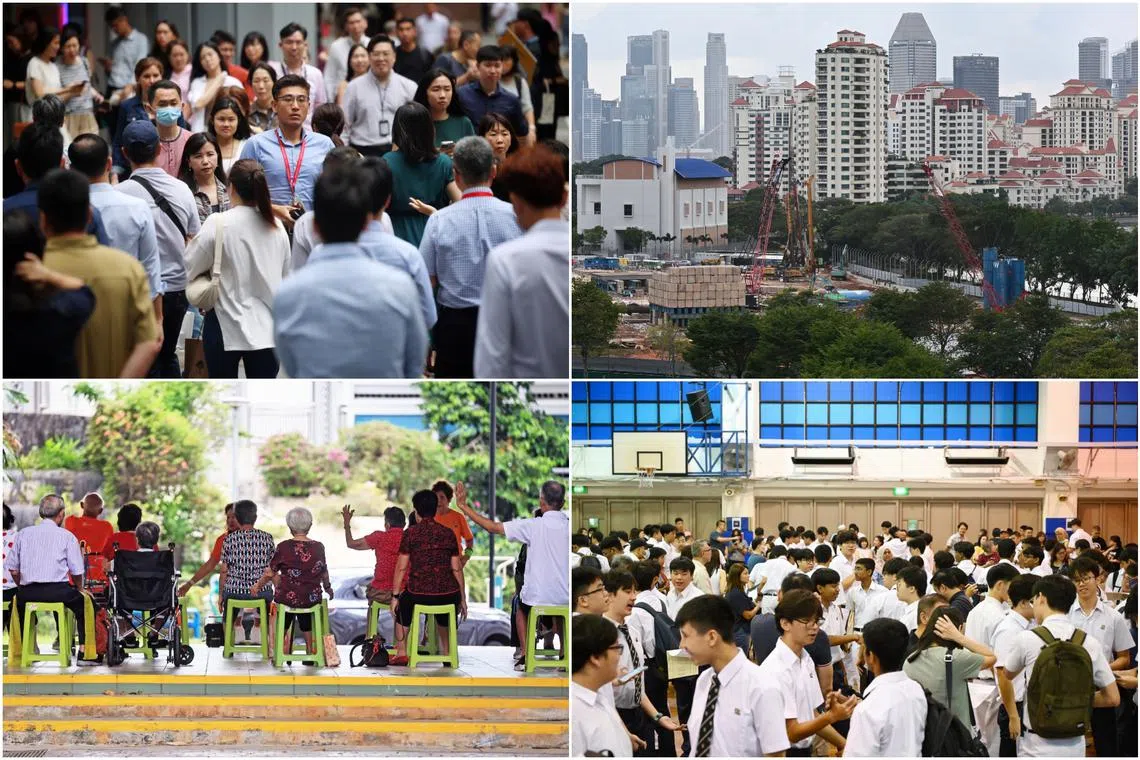‘Road map to navigate a changed world’: PM Wong on PAP manifesto for GE2025
Sign up now: Get ST's newsletters delivered to your inbox

Building on foundations laid by earlier generations, PM Lawrence Wong said he is determined to keep the miracle of Singapore going.
ST PHOTOS: JASON QUAH, LIM YAOHUI, ST FILE, KUA CHEE SIONG
The PAP unveiled its manifesto for the general election on April 17, a week before Nomination Day.
Prime Minister Lawrence Wong, who is leading his first hustings as the PAP’s secretary-general, described the manifesto as the party’s promise to all Singaporeans.
“It is our road map to navigate a changed world,” he said at a launch event. “We present a fresh team to tackle the challenges ahead, and we stand ready to serve all Singaporeans with new resolve.”
Building on foundations laid by earlier generations, PM Wong said he is determined to keep the miracle of Singapore going, and sought a mandate from Singaporeans to address their needs while taking the nation forward in a changed world.
Here is a summary of key proposals from the manifesto, titled Changed World, Fresh Team, New Resolve – Securing a Brighter Future for You.
Jobs and the economy
The last electoral term began at the height of the pandemic, and the Government acted quickly to save lives and livelihoods, such as through the Jobs Support Scheme and the Self-Employed Person Income Relief Scheme, said the PAP. Growth has recovered strongly since then, and the economy grew by 4.4 per cent in 2024.
The PAP said it will grow a dynamic economy that generates jobs and opportunities for all. It will provide more support for professionals, managers, executives and technicians, and nurture more Singaporean corporate leaders.
To ensure fair competition in the jobs market, the PAP Government will strengthen safeguards for fair employment, including through the Workplace Fairness Act.
It also wants to keep Singapore as a trusted hub for business, and to invest in transport and digital infrastructure and secure clean energy for the future, including by exploring nuclear power.
Businesses, especially small and medium-sized enterprises, will be supported to restructure and grow, while having their cost pressures eased through tax rebates. The PAP said it will help businesses access manpower and capital, and help firms expand into new markets.
Education
Major moves were made by the Government to reduce education stress and customise learning in the last five years, said the PAP. These included replacing streaming with subject-based banding,
The ruling party pledged to continue making education reforms so Singaporeans can be the best versions of themselves.
These include broadening definitions of success, further customising education for people of different abilities and interests, investing in teachers’ professional development and partnering parents and industry to deliver holistic education.
Four new special education schools will be built by 2030, and more early intervention centres will be established for children with developmental needs. The Development Support-Learning Support programme will also be expanded to more pre-schools.
For adult Singaporeans, more will be done to empower Singaporeans to upskill to advance in their careers. Help will also be given to companies to redesign jobs and invest in worker training, while Singaporeans who have lost their jobs will get help to bounce back through the SkillsFuture Jobseeker Support scheme,
Cost of living
Singapore was not spared the cost pressures driven by wars and supply chain disruptions, but Singaporeans received extensive help to cope with the spike in inflation, said the PAP. A $10 billion Assurance Package
Households here will continue receiving support for their living expenses, such as CDC vouchers, cash payouts and utilities rebates, for as long as necessary, said the PAP. Parents will enjoy expanded parental leave and lower pre-school fees, while support was recently enhanced for large families.
Social safety nets such as ComCare and Silver Support will be reinforced to help the most vulnerable Singaporeans, while Workfare for lower-wage workers will be enhanced and the Progressive Wage Model extended to more sectors.
The PAP said ComLink+ will also empower lower-income families to build better lives, and children from disadvantaged backgrounds will get a good start through help to achieve regular pre-school attendance and higher childcare subsidies.
Employment opportunities for people with disabilities will be boosted, while subsidies for adult disability services will be made more generous, it added.
Retirement adequacy
Seniors have been supported with schemes such as the $7 billion Majulah Package,
To help seniors who want to keep working, the PAP said it will raise the re-employment age, increase the Central Provident Fund (CPF) contribution rates for senior workers, and encourage the hiring and retention of seniors by co-funding wages.
For greater retirement assurance, it will review and enhance the CPF system and provide matching grants for voluntary top-ups to the CPF MediSave Account.
More active ageing centres will be built to keep seniors engaged and mobile, while subsidies for seniors needing long-term care will be increased and support for caregivers strengthened.
Healthcare
To meet the needs of an ageing population, Singaporeans have received MediSave top-ups, while MediFund was topped up by $1.5 billion in 2023
Looking ahead, healthcare capacity will be ramped up and waiting times shortened with some 13,600 beds added to the system in the next five years, while the nursing workforce will be expanded.
Singaporeans will be empowered to take charge of their health through programmes such as Grow Well SG for children,
The PAP said it will also boost support for mental health with a new National Mental Health Office,
Public housing
The PAP said it is on track to fulfil its promise to launch 100,000 flats between 2021 and 2025;
The ruling party pledged that every Singaporean will have the opportunity to own a high-quality, affordable home, with more than 50,000 new flats to be built in the next three years,
The new Housing Board classification model
The PAP said it will also explore more public housing options for higher-income couples and singles, while acting decisively when needed to keep the property market stable and sustainable.
It will also plan for the rejuvenation of HDB towns, including through the Voluntary Early Redevelopment Scheme, said the party.
A greener city
The PAP said it is committed to reducing carbon emissions so that Singapore reaches net zero by 2050.
There will be more green spaces, such as 25 new parks, 50km of park connectors
Flood resilience, land reclamation and redevelopment to protect Singapore from rising sea levels will be reintegrated to create beautiful waterfront living, such as on Long Island.
Commuting will also be made faster, greener and more seamless, with eight in 10 households to be within a 10-minute walk from a train station with the new Jurong Region and Cross Island lines and extensions to existing lines and improved bus services, it added.
Arts, culture and sports
To support Singapore’s arts scene, arts exposure programmes will be introduced in schools and pre-schools, and more arts apprenticeships and scholarships will be offered.
A new Museum of Design will be established, said the PAP. The SG Culture Pass
New sports facilities will be built in Clementi, Punggol and Toa Payoh, while existing ones in Hougang, Pasir Ris and Queenstown will be upgraded. Alongside a new indoor arena in Kallang, these facilities will bring active living and sports closer to Singaporeans.
A more united Singapore
The PAP said it will strengthen the nation’s cohesiveness by building the Singaporean identity and enhancing integration efforts.
It pledged to uphold Singapore’s multiracial and multi-religious society, and keep it an oasis of peace and harmony.
The party will also continue to refresh the nation’s social compact, nurture a stronger culture of giving, and strengthen the partnership between citizens and the Government, it added.
The full manifesto can be found at www.pap.org.sg/manifesto



